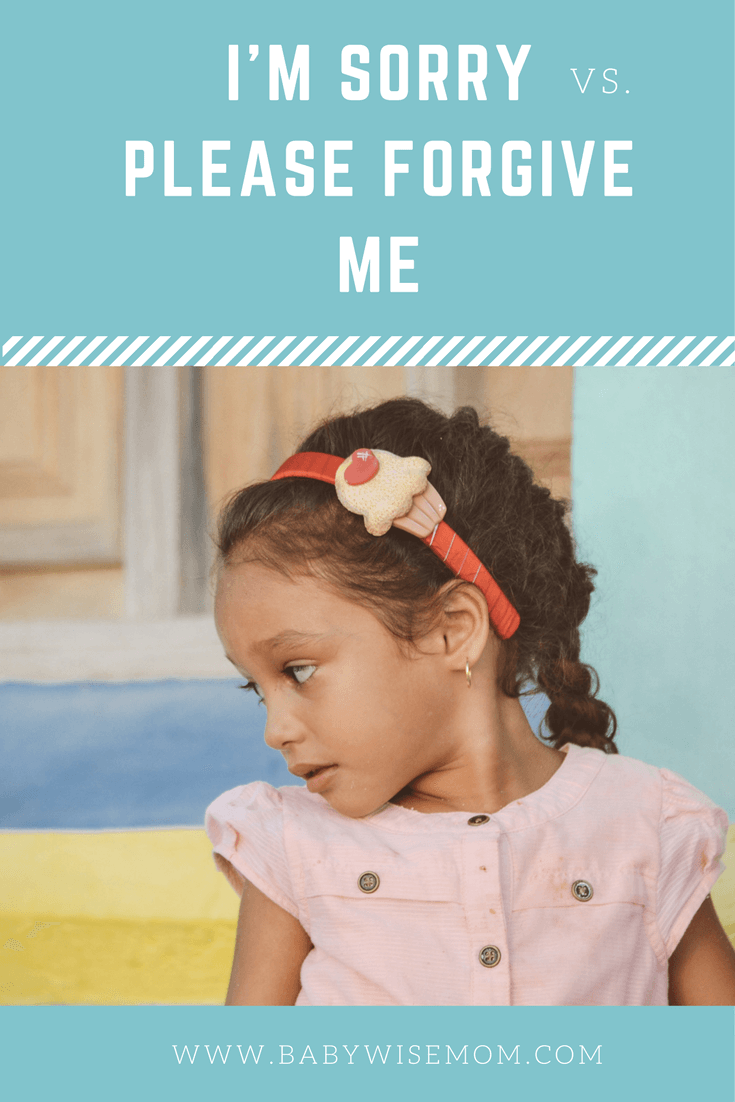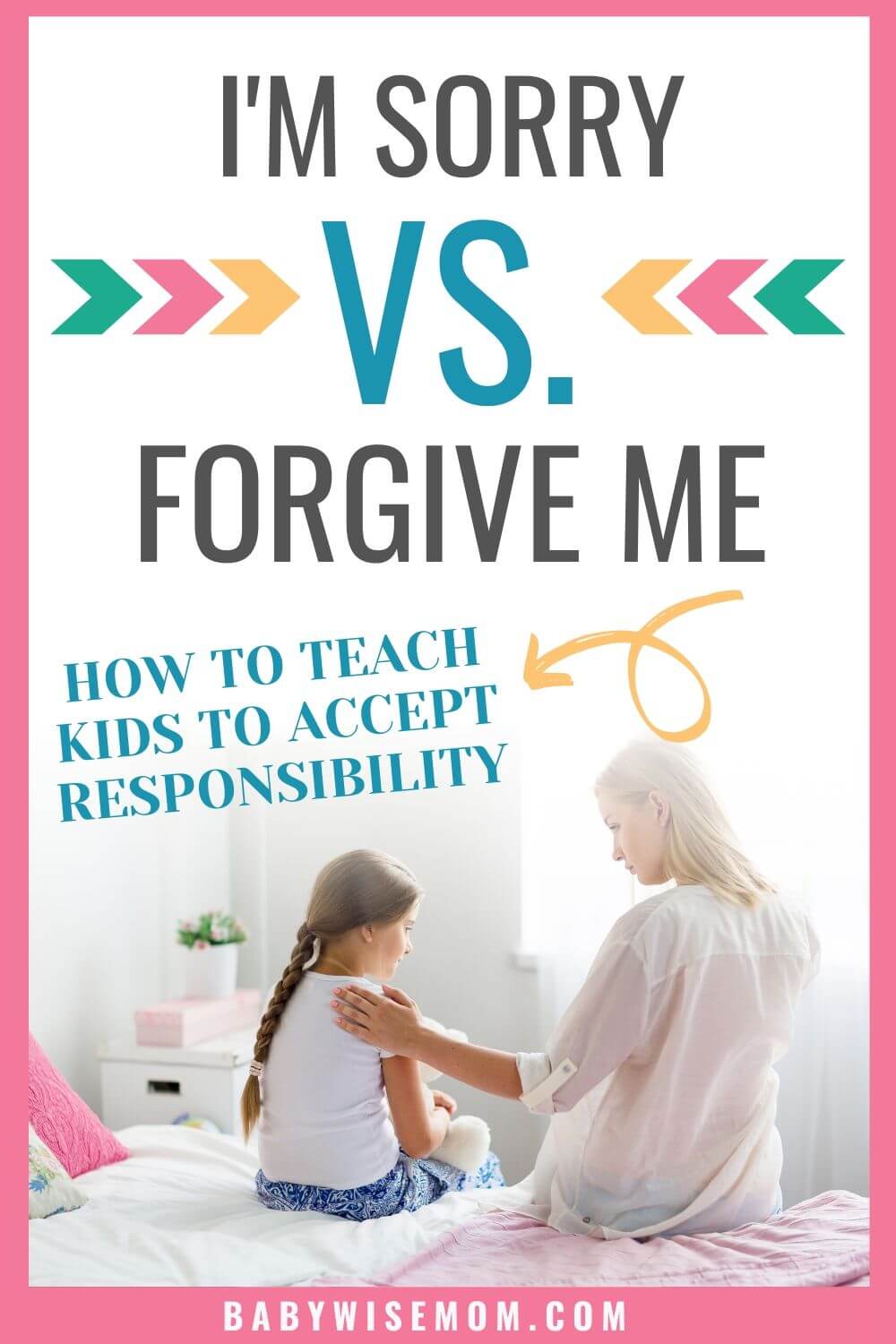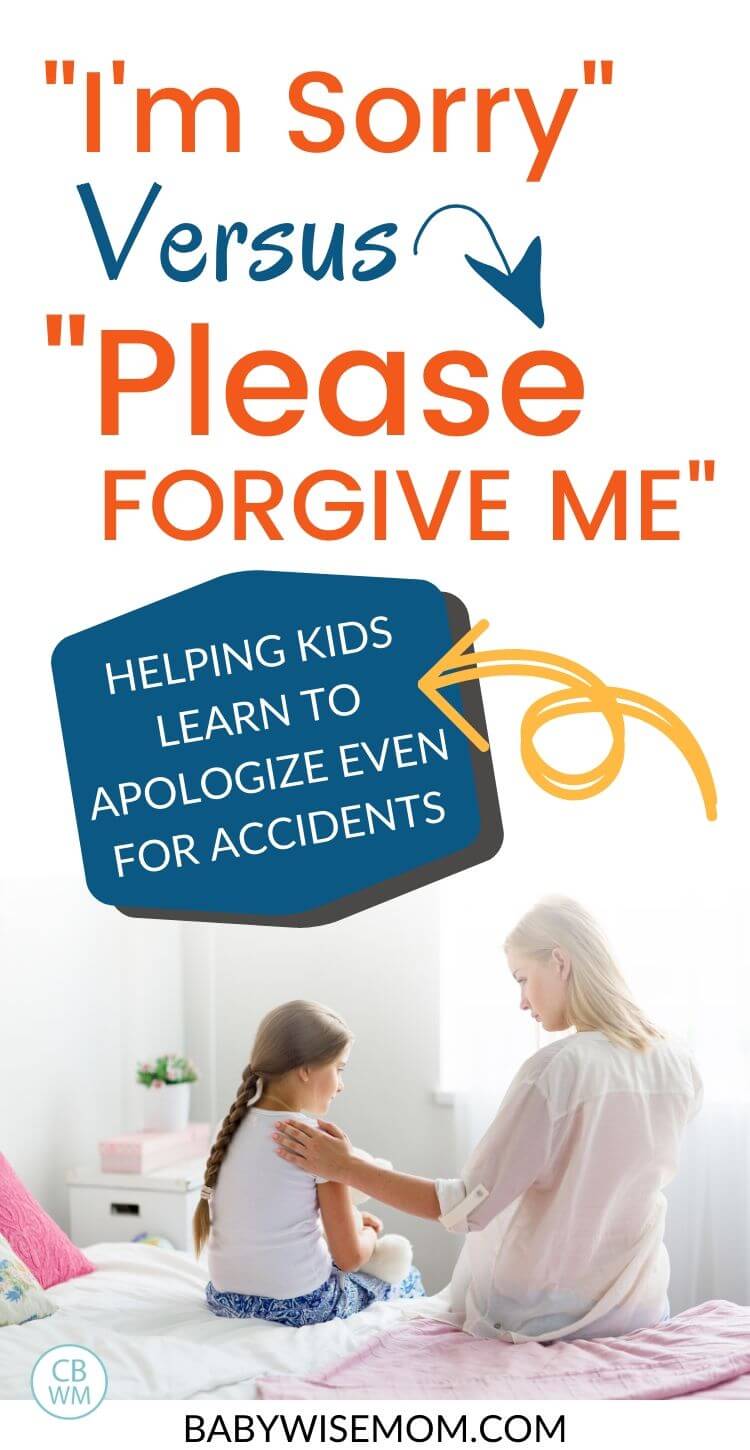Learn two great phrases to help kids apologize and distinguish between intentional harm and accidents. Why kids should apologize even for accidents.

It isn’t easy to apologize. It takes a lot of humility to admit you made a mistake.
This is true even if your mistake was a complete accident.
At our house, we require apologies even when the action was an accident.
Read: Why We Require Apologies Even for Accidents
A great way to help a child apologize for something even if the harm was unintentional is to distinguish it by using “I’m Sorry” in certain situations and “Please Forgive Me” in other situations.
Post Contents
Why You Should Teach Your Child To Apologize
On Becoming Preschoolwise talks about the importance of teaching your child to apologize when he has done something wrong. This does several things:
- Helps him learn to accept responsibility for actions
- Helps him admit when he is wrong
Can you see the value in this? Do you know people who don’t accept responsibility for their actions? My guess is you do. I think this is a very common problem in our modern day.
There really are many people walking around the world who don’t think anything is their responsibility.
There are also many people who don’t want to admit when they have done something wrong. We justify and justify our actions with a list of reasons why it was okay that we did what we did.
As Preschoolwise points out, “Relationships work best when there is no unresolved conflict simmering within them” (page 162).
“Relationships work best when there is no unresolved conflict simmering within them”
On Becoming Preschoolwise page 162
Teaching your child to apologize will set your child up for healthy relationships in life. This teaches your child humility. People who ask for forgiveness “…show that they believe the relationship is worth the possible embarrassment often associated with admitting wrong” (page 162).

Apologies When Harm was Unintentional
What about when the infraction was an accident? What if you didn’t mean to hurt someone? Do you still need to apologize?
Yes!
You still caused harm in some way, and whether you intended to or not, you did it.
It is like if you hit another car with your car. You can’t just say, “Oopps. I didn’t mean to do that” and have the police officer say, “Oh, in that case, no ticket” and the person you hit say, “Okay, then I will pay for the damage.”
I didn’t mean to so I am not responsible is not a reality in the world.

I’m Sorry vs. Forgive Me
This is where “I’m Sorry” vs. “Forgive Me” comes into play.
Apologizing for Accidents
“I’m Sorry” is for when your child does something wrong but unintentionally.
This happens all the time. Children are clumsy. Children don’t have great foresight. They also don’t have a lot of experience. They make a lot of unintentional mistakes.
One example is when two children are running around playing with each other. There is a good chance one of them is going to hurt the other somehow.
This is an appropriate time to say, “I am sorry I ran into you and hurt you.”
Apologizing for Intentional Actions
There will also be times your child does something intentionally. She might get mad and hit her brother.
This is when she says, “I am sorry I hit you. Will you please forgive me?”
Notice the pattern here. The person apologizes, names the infraction, and then asks for forgiveness.
This is the distinction. For an accident, you still apologize, but you do not go so far as to ask for forgiveness.
Distinguishing between these two scenarios is very valuable.
Even as a young four year old, Brayden would say, “But I didn’t mean to!” To this, I replied that I knew he hadn’t done it on purpose, but he had still done it and we need to apologize when we do something wrong.
When the infraction was intentional, asking forgiveness helps both parties. It creates a situation where the offender is at the mercy of the other person.
It puts the offendee in a position to offer mercy and forgive. Saying, “yes, I forgive you” means you cannot harbor anger over the situation.
Some children are very quick to apologize, while others have a hard time admitting fault. Admitting fault is an important life skill, and the practice of apologizing for mistakes, intentional or not, helps children learn this important trait. It will serve them well in a marriage, as a parent, as an employee, and as a friend.
Conclusion
You will be surprised at how much you will use this now that you know about it. You will also be surprised at how well your little preschooler can pick up on the subtleties of the language used here.
You will be teaching him to admit when he is wrong and to work to correct his wrong actions.
I am married to a man who is amazingly great at this. He is very humble and always apologetic. I can tell you that it is a great trait for a marriage relationship! What a great gift to give your child.

RELATED POSTS
- Why Bother To Forgive Others?
- Importance of Accepting Personal Responsibility
- A Simple Method for Teaching Positive Behavior
- Start Your Child’s Moral Training at Age 3
- Nurturing and Developing Your Child’s Conscience
This post originally appeared on this blog in February 2010
